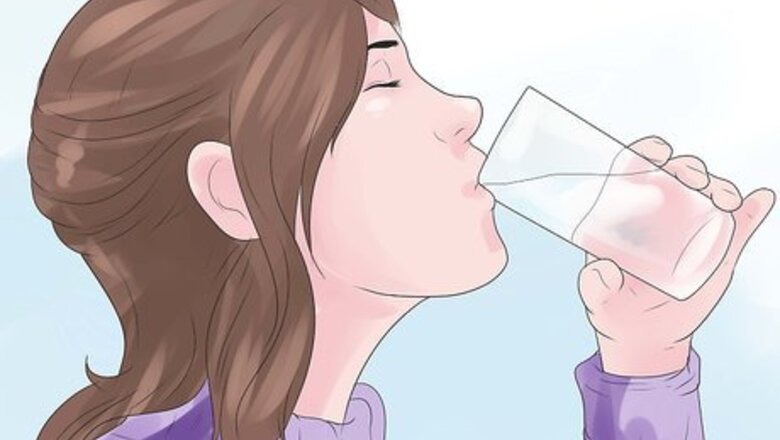
views
X
Trustworthy Source
Mayo Clinic
Educational website from one of the world's leading hospitals
Go to source
Vomiting while you're sick with the stomach flu is a terrible feeling, and it can leave you weak and dehydrated. Thankfully, experts note that there are a few ways you can reduce your chances of vomiting when you have the stomach flu.[2]
X
Trustworthy Source
Mayo Clinic
Educational website from one of the world's leading hospitals
Go to source
Drinking and Eating to Prevent Vomiting

Drink a small amount of water. Vomiting can cause dehydration; because of this, you need to replace the fluid you have lost with water. Keep in mind that you should only take small sips of water because if you gulp down a big glass and expand your irritated stomach, you could end up vomiting again. Take small sips of water every 15 minutes after you have vomited. Do this for three or four hours to hydrate yourself. If you're feeling moderate nausea, start hydrating yourself by drinking just 1 tablespoon (15 mL) of water every 10 minutes. If you haven't vomited in over an hour, double the amount of water you're taking in. Keep increasing your fluid intake until you can drink 8 fluid ounces (240 mL) of water every hour. Continue drinking at least 8 fluid ounces (240 mL) of water every hour until you're urinating normally every 3-4 hours.

Suck on ice cubes or popsicles. There are three benefits to sucking on ice cubes--one is that you can slowly begin to rehydrate and the other is that ice cubes will help numb your gagging reflex. On top of those two benefits, ice cubes and popsicles will also help you wash away the nasty taste left in your mouth after vomiting.
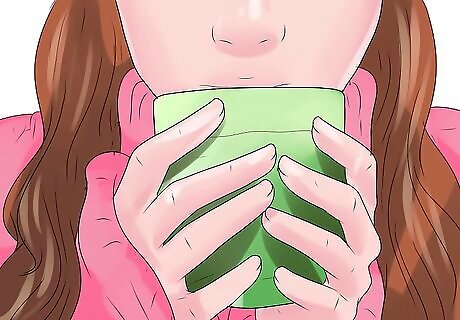
Consume other clear liquids. Wait several hours after vomiting before you start drinking liquids other than water. Once you have waited several hours, you will need to drink fluid with electrolytes, which are the minerals within your body that balance your metabolic processes. Vomiting leads to a decreased level of electrolytes--drinking electrolyte-rich drinks will help you to restore your metabolic processes. If you vomit again after you start to re-hydrate yourself, take a break to let your stomach rest. Then, start sipping on clear fluids again. Pedialyte is a great option for replacing your electrolytes. You can also find generic equivalents. However, it's best to avoid sports drinks, as they are high in carbohydrates and low in actual electrolytes. After you have vomited, wait several hours before drinking any clear fluids. When several hours have passed, sip on clear liquids every 15 minutes for three or four hours. Clear liquids include apple juice, electrolyte drinks like Pedialyte, weak tea, and clear broth.
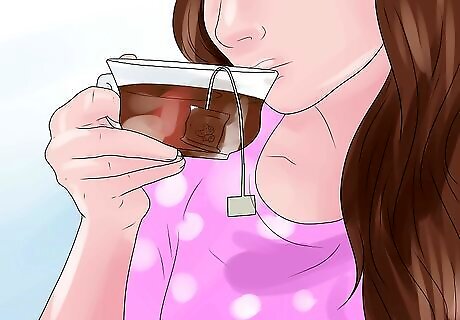
Drink ginger tea. Time and again, ginger tea has been proven to decrease the sensation of vomiting. Ginger has a soothing effect on the stomach, which will decrease your nauseous and chance of vomiting. You can buy ginger tea in your local grocery store. As an alternative, you can chew on and then spit out a small piece of raw ginger.

Move to eating bland food. You need to start eating as soon as you can, usually about 4 hours after you stop vomiting. Once you have worked your way through water, ice cubes, and clear liquids and continue to feel less nauseous, you can try to eat some simple foods that are easy on the stomach. Only eat food if you have not vomited for at least four hours. Crackers and biscuits can be great vomit stoppers.:
Avoiding Triggers

Avoid unwanted smells, tastes, and sights. If the strong smell of car fresheners makes you feel nauseated even when you are not sick, then you should definitely avoid them when you are. The things you see, smell and taste are also stimuli for vomiting, so knowing what makes you feel queasy really matters. For example, some people feel queasy when they see blood, even if it is just movie blood. Other people feel nauseous when they eat blue cheese, or gag when they smell garbage. Whatever your triggers are, stay away from them.
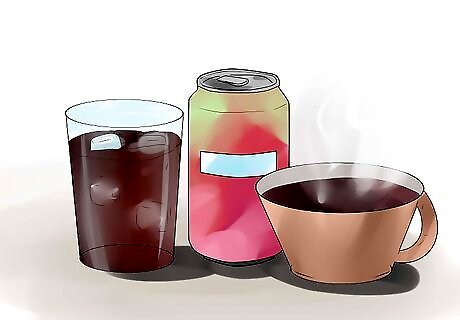
Steer clear of carbonated, acidic, and caffeinated drinks. All three of these liquids can stimulate the gag reflex and may even irritate the lining of your gastrointestinal tract. You will want to avoid them for at least a day after you have vomited. Carbonated beverages include all sodas and beer. Acidic drinks include orange juice, grapefruit juice, and other drinks made with citrus. Caffeinated drinks include coffee, black tea, and energy drinks.
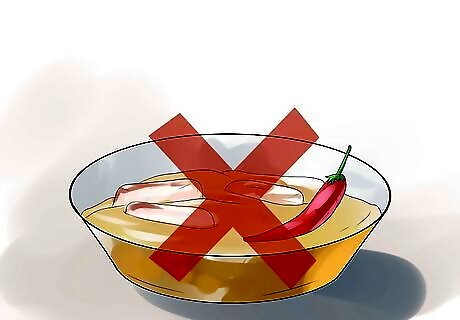
Avoid spicy and oily food. These types of food are clinically known to promote vomiting. Since your stomach needs to work double time to digest it, you will most likely vomit as a result. Wait at least 48 hours after vomiting before eating any sort of oily or mildly spicy foods.

Avoid riding in cars. If you have motion sickness, then vehicles are off limits. When you have the stomach flu, you already have a tendency to vomit. Riding in a vehicle will only increase your chance of vomiting. This is because rapidly changing direction (like sitting in the back of a car making a U-turn) stimulates receptors in the vestibular labyrinth of the inner ear. From the inner ear, impulses are transmitted via the brainstem into the cerebellum, which houses the vomiting center, causing you to become physically ill. If there is absolutely no way you can avoid riding in a car, ask the driver to take turns slowly and drive carefully so that no sharp movements are made. This can lessen your chance of getting sick.

Do not smoke. You probably already know that smoking is bad for your health. However, it is even worse for you if you are trying to stop vomiting. When you smoke a cigarette, you are inhaling nicotine. Nicotine causes the lower esophageal sphincter (the lower opening of your esophagus) to relax, which makes it much more likely that stomach acid will irritate the esophagus, causing you to vomit.
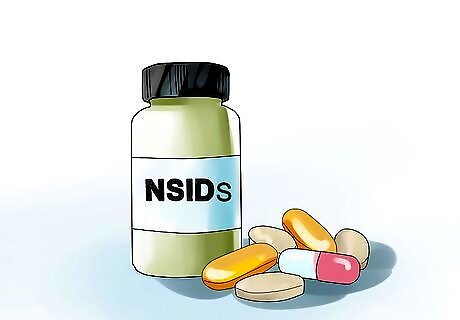
Avoid certain nonsteroidal anti-inflammatory drugs. Anti-inflammatory drugs are gastric irritants. These drugs inhibit the body’s production of prostaglandin, the natural chemicals that serve as messengers to promote inflammation. However, certain prostaglandins also serve to protect the lining of the stomach, and so using these drugs inhibits this protective effect, leading to irritation and vomiting. These drugs include aspirin, ibuprofen, and naproxen.
Using Relaxation and Distraction Techniques
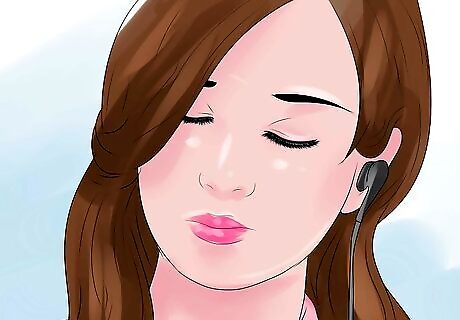
Think of positive thoughts. Vomiting starts in the brain--your mind’s perception of nausea can lead to you becoming ill. Because of this, you need to divert your attention from the thought of vomiting by imagining scenic places or other images that can relax you. When you begin to feel nauseous, picture something that will distract you or calm you down. Listening to music that will make you feel calm and happy can also help you enhance your positive thoughts. For example, when you begin to feel nauseous, picture Christmas morning. Imagine all of your family around you, the glowing tree, the log on the fire, etc.

Watch a movie or read a great book. Like thinking positive thoughts, engaging in an activity that will grab your full attention will help you to keep from vomiting. When your mind is engaged, it is less likely that you will feel nauseous, so you won’t vomit. Watch movies that won’t remind you that you’re sick. For instance, if you feel sort of queasy when you see blood, don’t rent a horror film or that new vampire flick. Stick with comedies, dramas, romances, etc.

Get some fresh air. Even if you feel too weak to go outside, you should still open a window to let fresh all into your room. Fresh air can do a nauseous person wonders. If you can, go sit in a chair outside. Let the breeze calm you down and look around at your surroundings. Focusing on something beautiful while breathing in fresh air can keep you from vomiting.

Stay in an upright position. Elevate the head of the bed by 45 to 90 degrees by propping yourself up on pillows. At the same time, elevate your feet at an angle higher than your body (again using pillows). This upright position can harness the power of gravity and help you to keep from vomiting. Keeping your feet higher than your center will also help improve blood circulation.




















Comments
0 comment